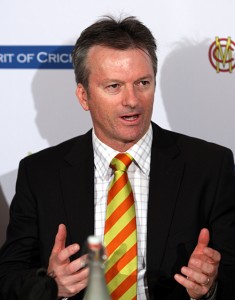
Guardian reporter David Hopps reports in a story published by the Sydney Morning Herald that former Australia cricket team captain Steve Waugh is advocating the use of lie detectors in an attempt to root out corruption in the scandal-plagued sport. Excerpt:
ANDREW Strauss and Mahendra Singh Dhoni will be encouraged to help stamp out corruption in cricket by taking lie-detector tests as the MCC uses the occasion of the 2000th Test match to step up its campaign to clean up the game.
The controversial proposal is the brainchild of former Australia captain Steve Waugh, who wants leading captains such as Strauss and Dhoni to act as ambassadors and role models by voluntarily putting their reputations on the line.
But the proposal is not supported by the Australian Cricketers’ Association, because lie-detector tests are not admissible in court.
”I applaud Steve Waugh for looking at creative and proactive ways to deal with corruption, but we wouldn’t support the use of polygraphs at this point in time,” ACA chief executive Paul Marsh said. ”Results can be affected if you’re nervous or under stress or whatever, so there may be reasons, other than not telling the truth, that you fail it and we couldn’t open players up to that.”
Waugh is at Lord’s as chairman of an MCC world cricket committee working party that was charged last year with investigating ways corruption might be eradicated. He made his chief proposal only metres away from where Strauss and Dhoni supervised practice ahead of a Test series that will decide whether England or India finish the summer as the No 1 team in the world.
The Australia Cricketers’ Association is right to reject lie detector “testing,” as it has no scientific basis. While polygraphy is inherently biased against truth-tellers, the “test” can trivially be defeated using simple countermeasures that anyone can learn and polygraph operators cannot detect.
It is heartening to see that the Federation of International Cricketers’ Associations has also come out strongly against lie detector “testing,” as ESPN Cricinfo reports:
Lie detectors should not be used to investigate corruption in cricket as many courts around the world refuse to recognise their validity, according to the international players’ chief Tim May. Steve Waugh, a member of the MCC Cricket Committee, has proposed the use of lie detectors to expose players involved in fixing matches, and he took a polygraph this week to show how they worked.
And while the England captain Andrew Strauss said he liked the idea of using lie detectors and would be happy to take a polygraph if they were introduced to catch corrupt cricketers, not all cricket figures share his opinion. May, the chief executive of the Federation of International Cricketers Associations (FICA), said his organisation “rejected outright” the idea of using lie detectors.
“I commend MCC and Steve Waugh for trying to be proactive in the fight against corruption, but lie detector tests are far from foolproof and not permissible as a means of determining people’s guilt or innocence in the courts of the majority, if not all, cricketing territories,” May said. “It is therefore totally unacceptable that players should be put under pressure to submit to testing that is far from foolproof.
“To publicly request players to make ‘some stand’ against corruption, by submitting to this ‘imperfect’ testing is irresponsible and FICA will oppose such actions in the strongest possible manner. The testing is far from foolproof – that’s why it’s not allowed to convict people in a court of law.
“It’s a no win situation for the players – they quite rightly should decline to submit to one – the testing is not foolproof, the players are not under suspicion for any corruption offence but now with the MCC publicly encouraging them to submit to one, if the player refuses, it looks like he is hiding something.”
May said he had written to the MCC to air FICA’s concerns over the matter. The Cricket Committee, which met at Lord’s this week, also suggested that the ICC’s Anti Corruption and Security Unit (ACSU) should have the power to perform sting operations similar to that staged by the News of the World last year against Salman Butt, Mohammad Amir and Mohammad Asif.
It should be noted that Steve Waugh’s proposal to polygraph cricketers is not something new. A proposal to polygraph cricketers every six months was considered and quite rightly rejected back in 2001.
Australian journalists covering this story would do well to speak with John Furedy, an emeritus professor of psychology at the University of Toronto and polygraph expert who is now back home in Australia.
Waugh may as well get the players to swear on the bible,
Koran, or whatever belief system they hold dear. Polygraph testing is basically voodoo
science that has earned its reputation via copious public exposure through
fiction and associations with US intelligence organizations. The legal system
however won’t touch it, and rightly so, because it’s junk science that relies
on the canny skills of its practitioners to sell the product’s dubious claims.
Blind studies have shown that the results are little better than basic
guesswork, and much of the focus on their usage in the USA basically revolves
around bluffing people into believing in the polygraph’s press and admitting
their guilt beforehand. I’ve studied the subject extensively via background
research for a novel and have spoken to law enforcement officials who use the
equipment, and the bluff component is the biggest factor to their usage,
especially as they know the results can’t be used in a court of law. Aldrich
Ames, the infamous American spy who sold out his country’s secrets to the
former USSR, passed numerous polygraph
tests, and has written extensively from prison on how easy it is to sail
through the procedure. Look it up.